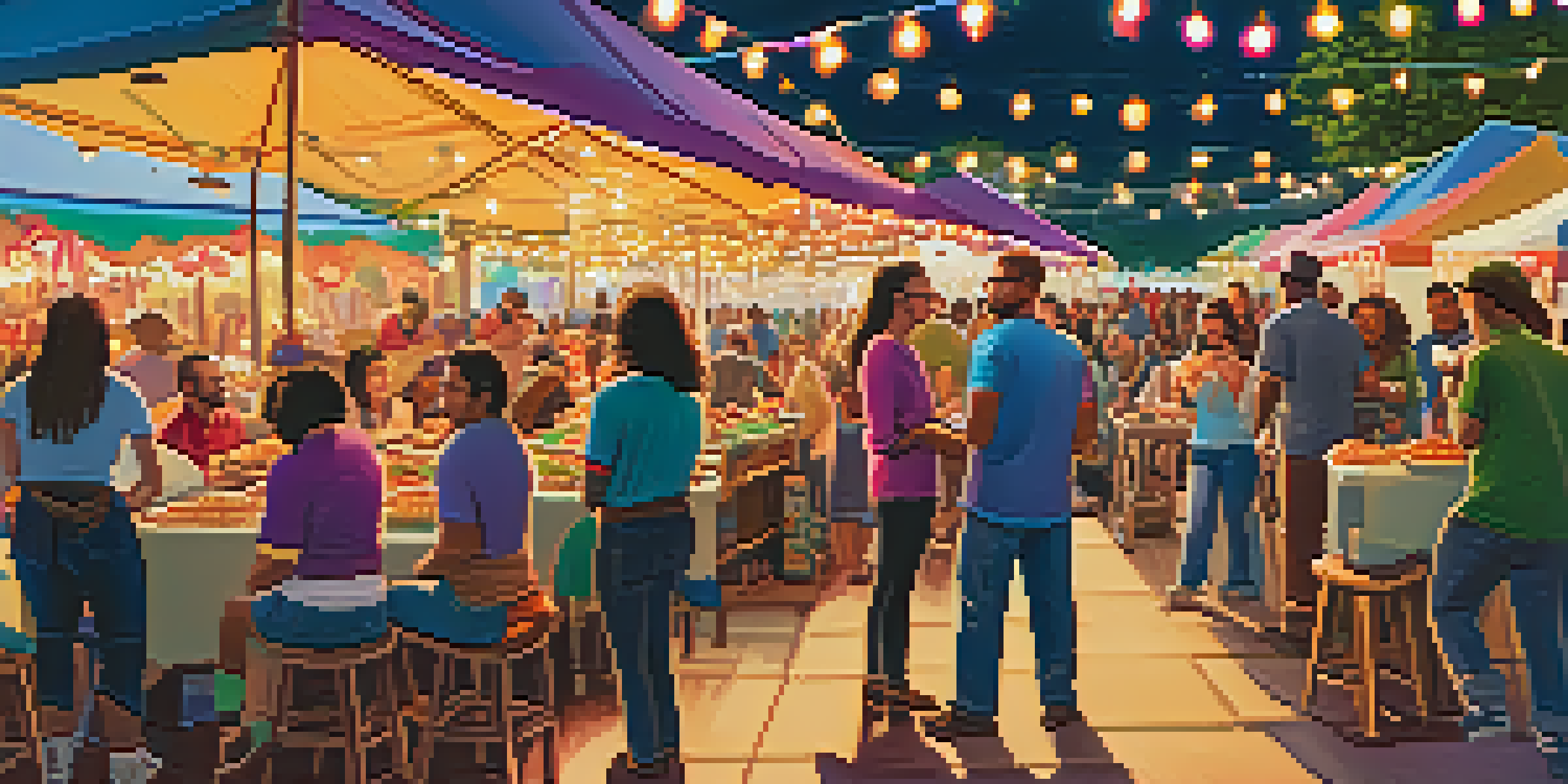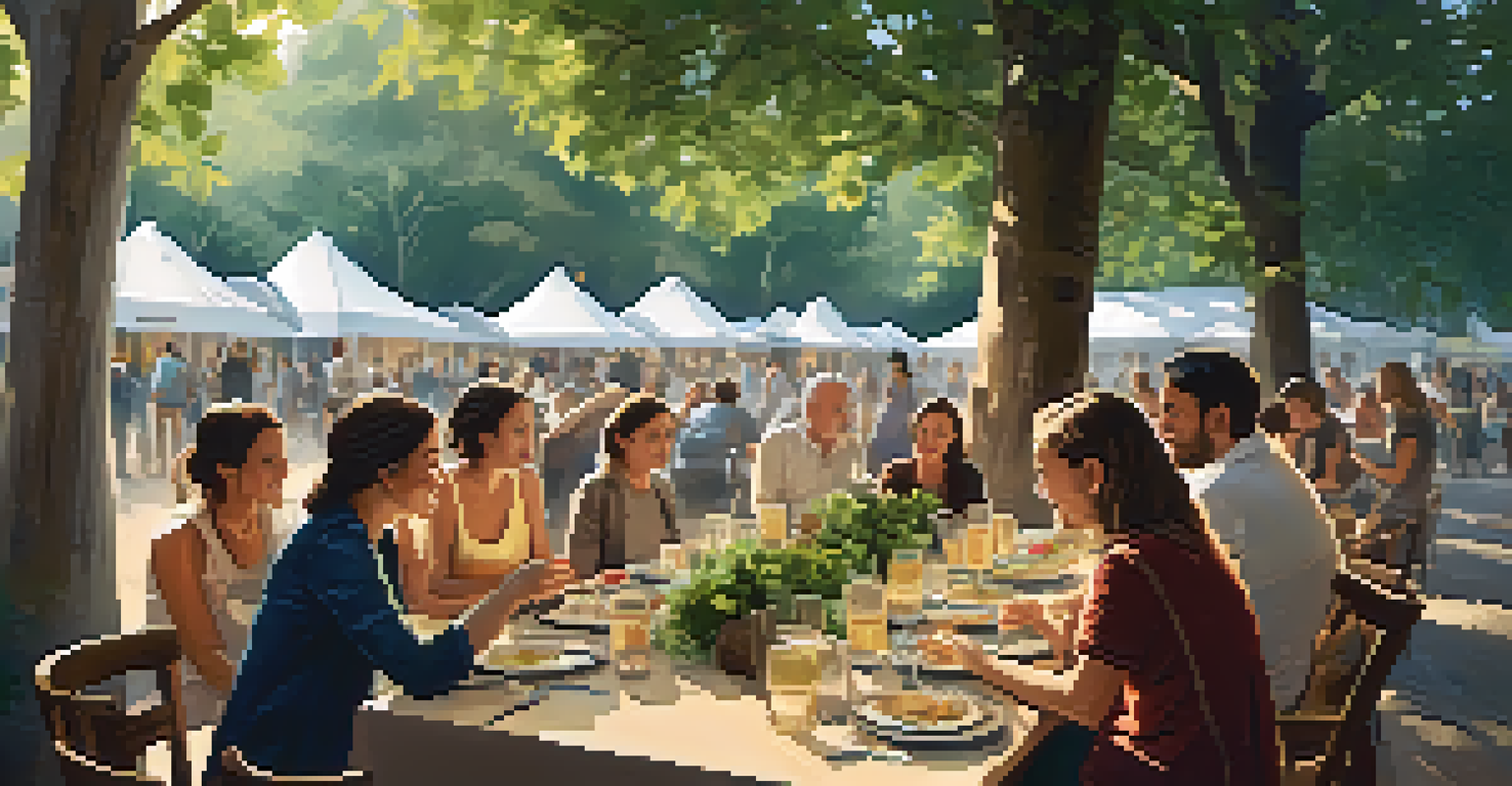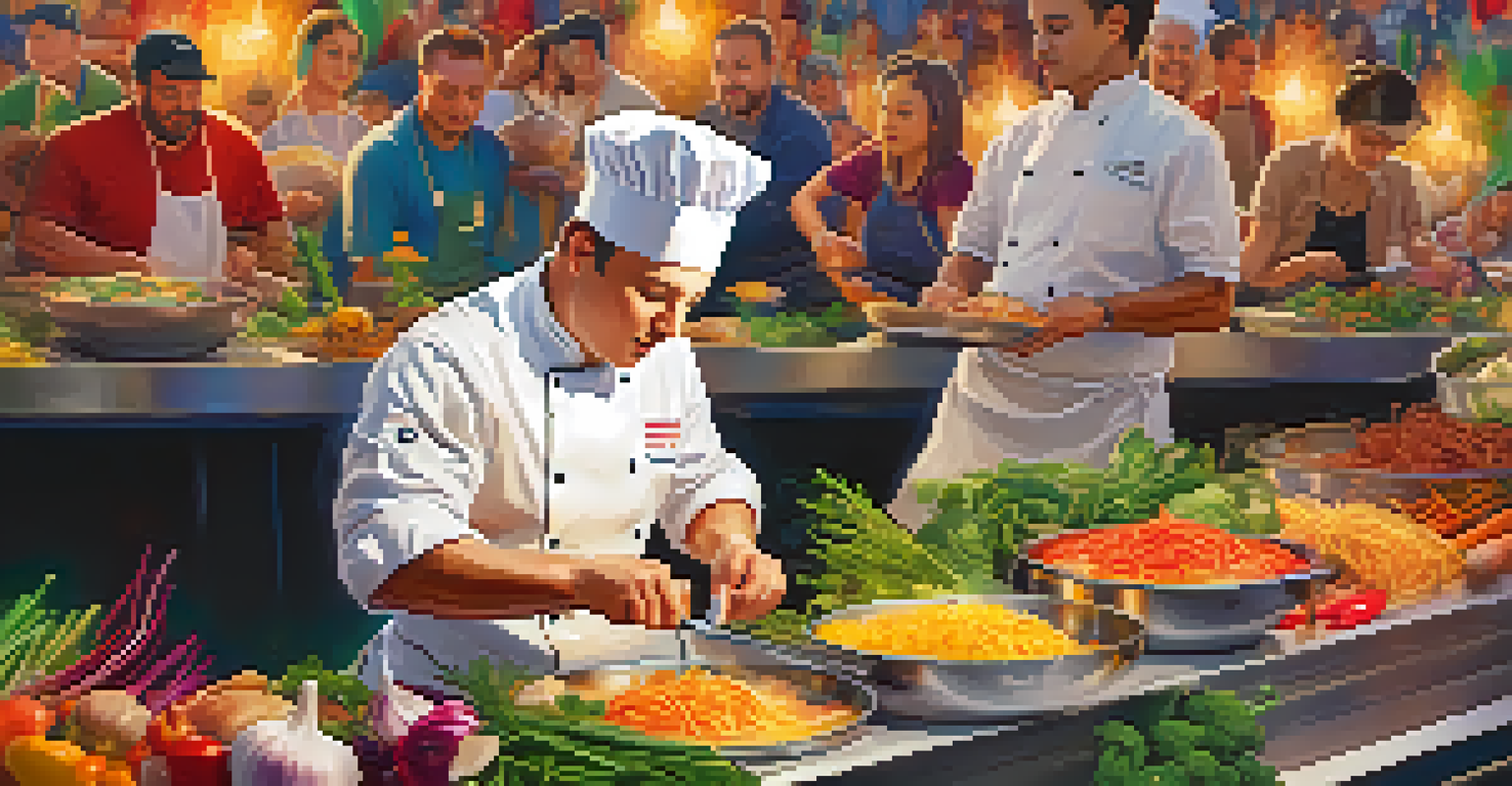The Role of Food Festivals in Celebrating Regional Cuisines

Food Festivals: A Celebration of Culinary Heritage
Food festivals serve as vibrant showcases for regional cuisines, allowing communities to celebrate their culinary heritage. These events often highlight traditional dishes that have been passed down through generations. Attendees not only get to taste unique flavors but also learn about the history and cultural significance behind each dish.
Food is a universal experience that brings people together.
For example, at the annual New Orleans Jazz & Heritage Festival, visitors can indulge in gumbo, jambalaya, and beignets while enjoying live jazz music. Such experiences create a deeper connection to the food and the community that produces it. Food festivals become a platform for storytelling, where each bite resonates with the rich traditions of the region.
Related Resource
Moreover, these festivals play a crucial role in preserving culinary practices that might otherwise fade away. By bringing together chefs, home cooks, and food enthusiasts, festivals help keep local recipes and cooking techniques alive for future generations.
Boosting Local Economies Through Food Festivals
Food festivals are not just about delicious bites; they also provide a significant boost to local economies. When festivals attract visitors, they generate revenue for local vendors, restaurants, and hotels. This influx of tourism helps sustain small businesses and creates job opportunities within the community.

For instance, the Gilroy Garlic Festival in California draws thousands of visitors each year, showcasing the area’s garlic production while benefiting local farmers and artisans. The festival creates a ripple effect, where increased foot traffic leads to heightened sales for nearby shops and eateries. This economic impact underscores the importance of food festivals as a catalyst for community growth.
Food Festivals Celebrate Heritage
These events showcase regional cuisines, allowing communities to connect with their culinary traditions and learn their historical significance.
Additionally, local governments often support these events through funding or resources, recognizing their potential to enhance regional visibility. As these festivals continue to thrive, they help position towns and cities as culinary destinations, drawing even more visitors year after year.
Fostering Community Connections at Food Festivals
Food festivals are a hub for community interaction, bringing people together through a shared love of food. They provide a casual atmosphere where attendees can mingle, share stories, and forge new friendships. This sense of community is invaluable, especially in today’s fast-paced world where personal connections often take a backseat.
Culinary traditions are a treasure that should be celebrated and preserved.
For example, many festivals feature communal dining experiences, allowing strangers to sit together and enjoy a meal. This not only breaks down social barriers but also fosters a spirit of camaraderie among participants. When people gather over food, they share not just dishes but also cultures, traditions, and life experiences.
Related Resource
Through workshops, cooking demonstrations, and tastings, festivals encourage collaboration between local chefs and community members. Such interactions strengthen community bonds and inspire the next generation to appreciate and continue their culinary traditions.
Showcasing Diversity in Regional Cuisines
One of the most exciting aspects of food festivals is their ability to showcase the diversity of regional cuisines. Every festival presents an opportunity for attendees to experience a wide range of flavors, ingredients, and cooking styles. This exposure fosters appreciation for different culinary traditions and encourages a more inclusive view of food culture.
Take the Taste of Chicago festival, for instance, which features everything from deep-dish pizza to gourmet tacos. This melting pot of flavors not only represents the city’s culinary landscape but also highlights the stories of the diverse communities that contribute to it. Visitors leave with a broader understanding of what makes each cuisine unique.
Economic Boost for Local Communities
Food festivals generate revenue for local businesses and create job opportunities, reinforcing their importance as economic catalysts.
In addition, these festivals often encourage chefs to experiment with fusion dishes, blending elements from various cuisines to create something new and exciting. This culinary innovation not only entertains but also sparks conversations about identity, tradition, and the evolving nature of food.
Supporting Local Farmers and Food Producers
Food festivals play a pivotal role in supporting local farmers and food producers by providing them a platform to showcase their products. Many festivals emphasize farm-to-table principles, connecting consumers directly with the source of their food. This relationship helps promote sustainable practices and encourages attendees to consider where their food comes from.
For example, at farmers' markets integrated into food festivals, visitors have the chance to meet local growers and taste fresh produce. This direct interaction fosters a sense of trust and appreciation for the hard work that goes into food production. It also inspires consumers to make conscious choices about purchasing locally sourced ingredients.
Related Resource
By highlighting local agricultural practices, food festivals contribute to the preservation of regional biodiversity and promote seasonal eating. This not only benefits the environment but also ensures that communities remain resilient and self-sufficient in their food systems.
Encouraging Culinary Innovation and Collaboration
Food festivals often serve as incubators for culinary innovation, encouraging chefs to experiment with new techniques and ingredients. They provide a space for culinary professionals to collaborate, share ideas, and push the boundaries of traditional cooking. This creative environment fosters excitement and inspires attendees to explore cooking beyond the familiar.
For instance, chefs might participate in competitions or collaborative pop-up events during festivals, showcasing their unique interpretations of regional dishes. This not only entertains but also educates audiences about the versatility of local ingredients. Visitors leave with fresh ideas on how to approach their own cooking.
Fostering Community Connections
By bringing people together over shared culinary experiences, food festivals strengthen community bonds and promote social interaction.
Additionally, such collaborations often lead to the creation of signature dishes that become synonymous with the festival itself. These innovations can spark trends within the culinary world, influencing menus and dining experiences long after the festival ends.
Creating Lasting Memories Through Food Experiences
At their core, food festivals are all about creating memorable experiences. They invite participants to engage with food in a way that transcends mere consumption. Each dish, conversation, and performance contributes to a tapestry of memories that attendees carry with them long after the festival concludes.
Think about the aroma of freshly cooked street food wafting through the air or the sounds of laughter shared over a communal table. These sensory experiences create a vibrant atmosphere that resonates with people of all ages. Food has a remarkable ability to evoke emotions, and festivals harness this power to forge connections.

Ultimately, the memories made at food festivals often inspire individuals to explore their culinary landscapes, try new recipes, or even start their own cooking adventures. By celebrating regional cuisines in such an immersive way, these festivals leave a lasting impact on both personal and community levels.